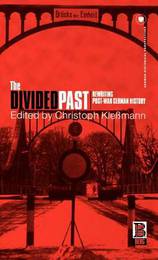
|
The Divided Past: Rewriting Post-War German History
Hardback
Main Details
| Title |
The Divided Past: Rewriting Post-War German History
|
| Authors and Contributors |
Edited by Christoph Klessmann
|
| Series | German Historical Perspectives |
|---|
| Physical Properties |
| Format:Hardback | | Pages:224 | | Dimensions(mm): Height 216,Width 138 |
|
| ISBN/Barcode |
9781859735114
|
| Classifications | Dewey:943.087 |
|---|
| Audience | |
|---|
| Illustrations |
bibliography
|
|
Publishing Details |
| Publisher |
Bloomsbury Publishing PLC
|
| Imprint |
Berg Publishers
|
| Publication Date |
1 October 2001 |
| Publication Country |
United Kingdom
|
Description
This book tackles head on the central problems of writing German post-war history in the aftermath of unification. Since 1990, historians have been debating whether the development of the Federal Republic and the East German State constituted separate histories or whether they share what should be considered a joint past. This book addresses the specific forms of segregation and interconnectedness between the 'two Germanies' and acknowledges the asymmetry of the relationship, as well as the effect that this had on the internal and external policies of both sides. This is a book that confronts the need for historiography to break away from the traditional master narrative. It offers an alternative in the form of the differing points of view necessary to gain a new perspective on the central problem of a separate, yet joint, German post-war history. Drawing on both methodological and historiographical approaches, authors tackle this vexed problem in the context of generational and woman's history, secularization, the labour movement, and the legitimization of the "workers' state", and culminate by addressing the perennial question: how does a nation live with catastrophe? 'Includes both programmatic statements and examples of work from a German national perspective ...For Klessmann, although the two states were separate entities, their histories were nonetheless inextricably interconnected. He believes that by exploring the influence of each German state on the other, much can be learned about the postwar Germanies ...According to Klessmann, the West was present in the East in a variety of ways, but perhaps most importantly as "an image transmitted via the media and relatives that served as a constant point of reference for East Germans judging their standard of living".' Journal of Modern History, Volume 75, Number 3, September 2003
Author Biography
Christoph Klesmann Professor,Center for Research on Contemporary History, Potsdam, and University of Potsdam
Reviews'Unusually coherent ... a useful insight into some innovative recent research on post-war Germany, and convincingly adds empirical flesh to the argument for approaching it as a story of 'separation and interconnection'.' 'The great strength of the volume is indeed that from a variety of perspectives it shows how the history of the Federal Republic can be invigorated by a critical appreciation of the history of the GDR, and how both societies were inextricably linked, even through the years of the deepest gulf between them.' History 'Klesmann has lead the way in conceptualising the historical relationship between the two successor states of the Third Reich ... this book will make an important contribution towards a deeper and more complex understanding of Germany and her vexed history of national identities.' German Politics
|